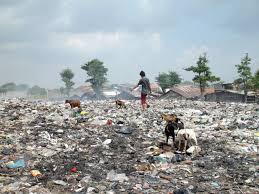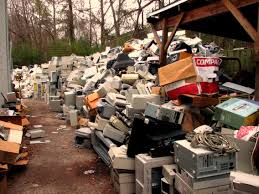
I'm the same. When our old television broke down, my husband and I needed a new one. (I say 'need', but that's a relative term because it's neither food nor water.) But as you grow less active with age, television offers entertainment and mental stimulation. That being said, we chose a lower-priced television we could pay off with a small amount each month, and the delivery man removed our old one. I didn't give any thought to where it would go—hoped someone would strip it down and dispose of the parts with all due care about recycling.
However, campaigners claim thousands of broken televisions, computers, microwaves and refrigerators are being illegally exported to African countries and dumped gigantic landfills like Agbogbloshie in Ghana because it costs less than recycling them in their countries of origin.
41 million tonnes of 'e-waste' worth over £34 billion (51,440,682.79 USD) were discarded globally in 2014, according to a shocking report by United Nations University who claim out of the 41 million tonnes, only 6 million tonnes was recycled properly.
Some of the appliances leak toxic elements such as lead and mercury which harms the environment. Young men search amongst the broken goods and toxic fumes hoping to find something worth selling.

Apparently, recycling in the European Union and the UK costs money and people in Africa are still paying for the throw-away electrical equipment.
The waste discarded in 2014 contained about 300 tonnes of gold, 16 million tonnes of iron and nearly two million tonnes of copper as well as significant amounts of silver, aluminium and palladium. Alarmingly, it also contained substantial amounts of life-threatening toxic material like mercury and cadmium which can cause organ failure and severe mental impairment if they pollute the local water supply.
While the US and China produce almost a third of the world's combined e-waste, the top producers per-capita are the wealthy nations of northern and western Europe: Norway, Switzerland, Iceland, Denmark, and the UK.
The escalating global e-waste problem is driven by the rising sales and shortening life cycles of electrical and electronic equipment. Source: Daily Mail.
How can we stop this problem of continually needing new and better 'things'? First, the manufacturers should make products to last. Second, we should give serious thought to the health of our beautiful world. Just imagine people in the future discovering huge areas of nothing but rusting metal and chemicals. The scenario would make an excellent plot for a novel, but this one will be real in the future. When Edith Parzefall and I co-wrote the futuristic Higher Ground series, we touched on this problem.
How did you dispose of your last piece of electrical equipment?





 RSS Feed
RSS Feed
